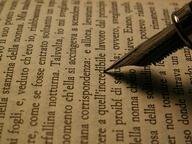Quiz Answer Key and Fun Facts
1. The author, Aleksandr Solzhenitsyn, wrote the novel based on his own experiences in a Gulag. What hirsute facial feature did he associate with Joseph Stalin that ended up in his arrest?
2. A guy who "licks out bowls, puts his faith in the infirmary, or squeals to the screws", what happens to him?
3. What forbidden item did the wardens find on The Captain when he was frisked during line-up?
4. What was the place of punishment within the camp known as?
5. By what name is the protagonist most commonly referred to in the novel?
6. What did the prisoners hope for to help them escape from the arduous work?
7. Where does Shukhov keep his spoon?
8. The cook becomes distracted when slopping oats into the bowls set up by Shukhov and Pavlo for their gang's meal allowing them to get served two extra bowls of food. Who helps them to get two extra bowls of food?
9. What structure is Gang 104, Shukhov's gang, building in the book as part of the "Socialist Community Development" program?
10. What ailment does Senka suffer from?
Source: Author
riflingthruit
This quiz was reviewed by FunTrivia editor
LeoDaVinci before going online.
Any errors found in FunTrivia content are routinely corrected through our feedback system.

